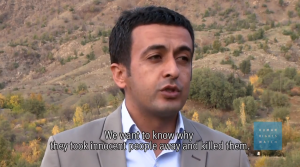Justice key to Kurdish peace process
 Human Rights Watch has released a video that calls attention to the state killings and disappearances of Kurdish civilians in the 1990s committed by Turkey.
Human Rights Watch has released a video that calls attention to the state killings and disappearances of Kurdish civilians in the 1990s committed by Turkey.
It highlights the importance for immediate action to be taken in regard to the torture, disappearances and killings of Kurdish civilians that have never been investigated because there is a time limitation in the Turkish law on prosecution: A murder is timed out after 20 years which means the state-killings mentioned in the video that were committed in the 90s will not be able to be brought up in court in 2 or 3 years time. The time limitation is described as an obstacle to justice. Human Rights Watch underlines that there should not be time limitations on cases of human rights violation.
Emma Sinclair-Webb, a senior Turkey researcher at Human Rights Watch, said:
Justice for the crimes of the 1990s is an important element among the human rights steps to resolve the Kurdish issue.
Ending decades of impunity for security forces and other public officials for the serious human rights violations perpetrated in the 1990s will take a real commitment from the government and prosecutors.
Human Rights Watch concludes that Turkey has made no real effort to investigate the injustice committed against the Kurdish people during the 90s and prosecute those responsible despite efforts from Kurdish villages that took their cases to the European Court because they could not obtain justice in Turkish courts.
They won against Turkey for torture and killings of relatives, the latest verdict being announced 2 weeks ago:
In the most recent European Court ruling on April 16, 2013, in the case of Meryem Çelik and others, the court held Turkey directly responsible for the July 1994 disappearance of 12 men who are presumed dead, and the killing of another, following a military operation in a village in Hakkari province.
The court further ruled that there had been a failure to investigate the 13 cases or the circumstances leading to the death of a fourteenth man whom soldiers allegedly shot dead in the village during the operation. The court ordered compensation to the families totaling €1.4 million.
On April 11, a reform in the Turkish law was ratified which lifted the time limitation on prosecuting violations of human rights. This is good news in that the time limitation will not be an additional obstacle to the struggle of achieving justice in state-perpetrations committed from 1993 and earlier.
But the lift on the time limitation does not necessarily imply that the Turkish state will take responsibility for the crimes committed against the Kurdish people in the 1990s. This seems a fair assumption considering that we only have to look back 18 months to the Roboskî Massacre that has yet to be investigated in a proper and satisfactory way.
The peace process in Turkey is not just a negotiation between the Turkish government and Abdullah Öcalan on how to get fighters from the Kurdish rebel group, PKK to lay down arms. The peace process is dependent on a transparent and comprehensive investigation of the crimes committed against the Kurdish people throughout time.
One can question the sincerity of the Turkish government about the peace process when it is not able to even conduct such an investigation on the Roboskî Massacre.
Veli Encü whose family members were killed in the Roboskî Massacre said
As the Roboski family we would like to express our support for the peace proces. But we want to underline that Roboski is a part of the peace process. The perpetrators must be brought to justice.
Comments
Pingback: Kurdish News Weekly Briefing, 26 April – 2 May 2013 « Peace in Kurdistan